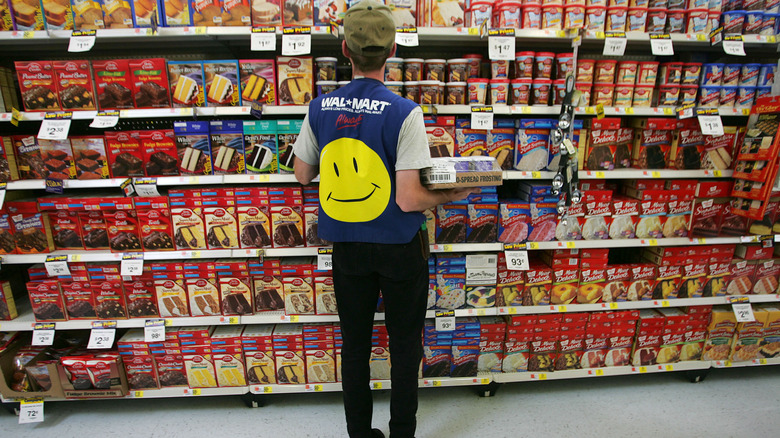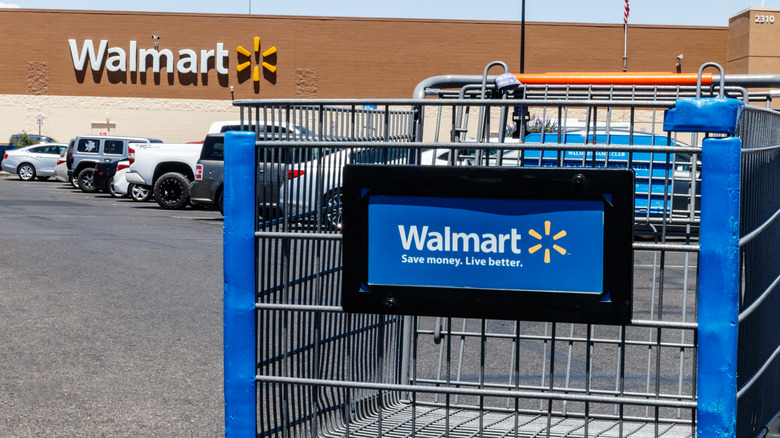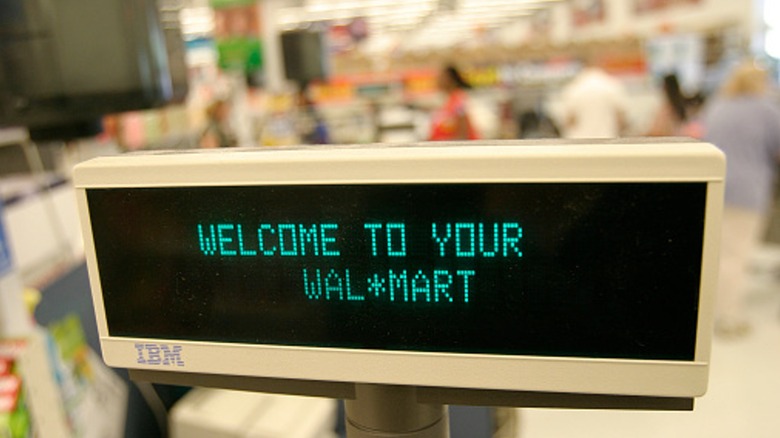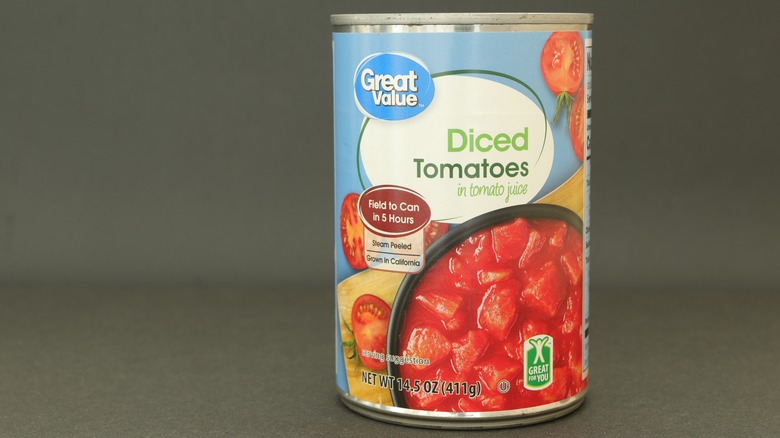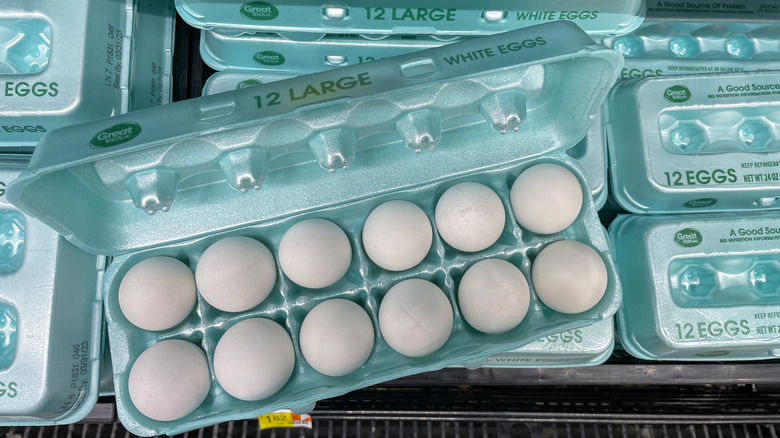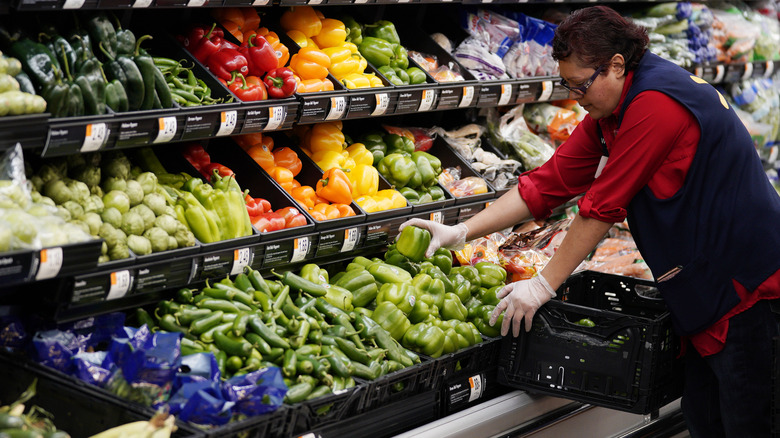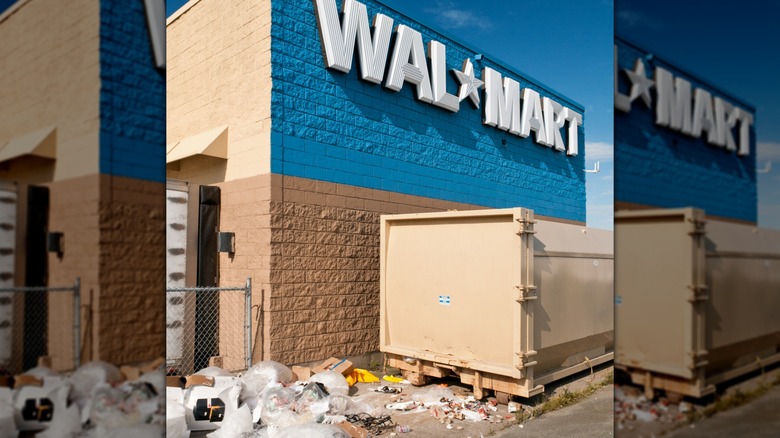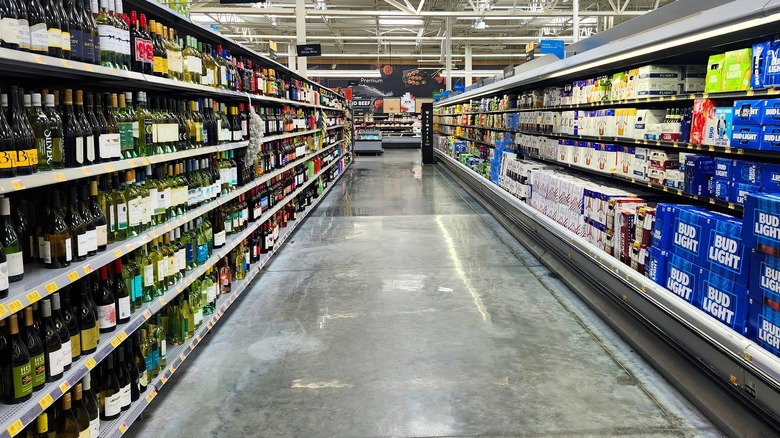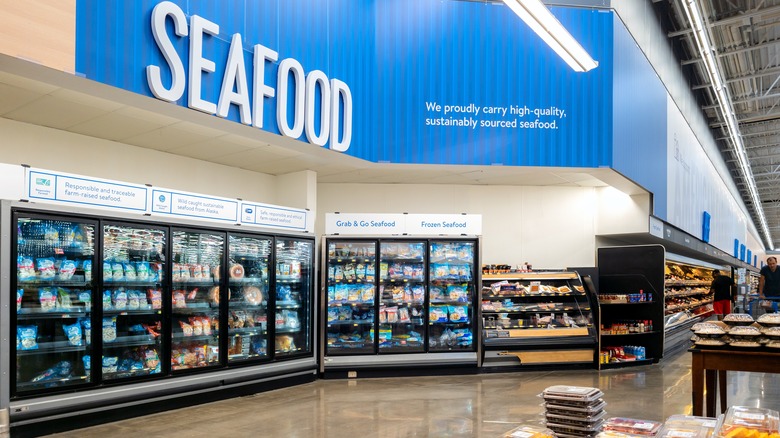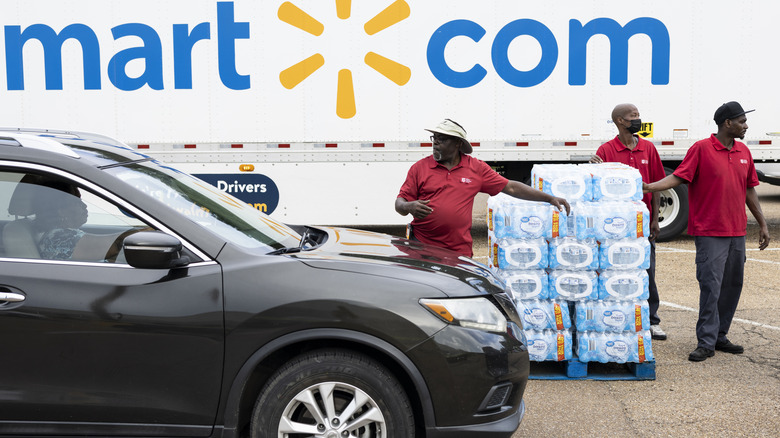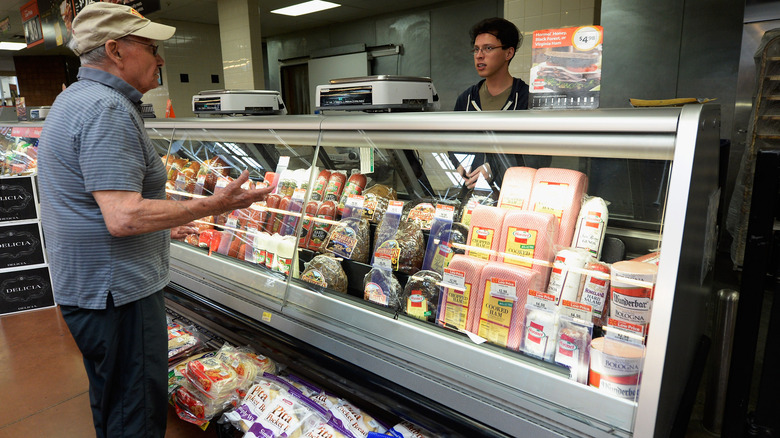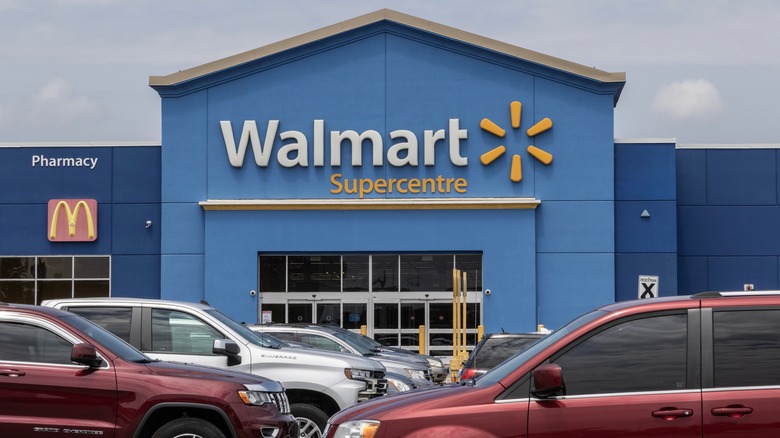12 Shady Things About Walmart's Grocery Department
It really wasn't that long ago that there was no such thing as Walmart. After the first location opened its doors in 1962, the chain grew at a shocking rate. There were 24 stores just five years later, and in 1988, Walmart officially expanded into groceries with the first Supercenter. With thousands of retail stores around the world and millions of products waiting to be dispatched at the click of a mouse, Walmart has shaped the way the world shops.
That hasn't come without controversy, though, and in 2024, Walmart announced it was going to be pioneering the use of AI technology to predict when you were going to run out of groceries, and reorder them automatically for you. Wish you could come home from walking the dog to find all your shopping done and put away? With the combination of AI tech and Walmart's In-Home Delivery Service, that just might be the way of the future. If that sounds more like something out of a dystopian science fiction novel, buckle up.
Walmart's domination in the grocery game comes with some major caveats, including accusations of predatory pricing, misleading claims, and unethically-sourced products. There are also claims that the company's success has come at the cost of countless livelihoods, which makes for some serious accusations that have involved Walmart's grocery department. This is the shadier side of Walmart.
Walmart has been accused of using market power to leverage deals, raise prices, and put others out of business
It's no secret that the prices of groceries has remained uncomfortably high, and economists have suggested that Walmart — and other big box stores — have something to do with that. There's a few things going on here, and let's start with Stacy Mitchell's essay in The New York Times. Mitchell is the executive director of the Institute for Local Self-Reliance, and explained that Walmart's size and buying power allowed it to force suppliers to give it deep discounts. Those suppliers then end up charging other, smaller stores higher prices.
Walmart's ability to sell grocery items at a lower cost has allowed it to become a favorite-by-necessity, and as of 2023, about ¼ of all grocery dollars spent were spent at Walmart. Small grocers are forced out of business, entire communities find themselves out of luck, and those without access to personal transportation or mass transit struggle.
FTC Commissioner Alvaro Bedoya has been actively investigating the waterfall effects of Walmart's dominance, explaining to Time: "What you're left with is some of the poorest people in the country, some of the people in the most underserved areas, are left without a place to buy fresh groceries, or just groceries, period." Hardest hit communities include rural and urban populations, and although small grocers have in some cases formed co-ops to try to compete with Walmart, it hasn't been enough.
In some areas, Walmart is the only option
Walmart has managed to grab a shocking amount of control over the grocery store business in areas across the country. In 2019, Visual Capitalist put together a map of the areas where Walmart controlled most of the grocery market, and it was eye-opening.
Take Bismark, North Dakota. With a population of more than 135,000, Walmart held 83% of the market share. In five areas, it held 90% or more, with a 95% market share control over Atchison, Kansas. Here's some food for thought: According to U.S. antitrust laws, things start getting iffy when a corporation holds more than 50% of a market share in any particular area. In Walmart's case, it's surpassed that in no less than 43 major metropolitan areas around the country.
Even though Walmart execs have spoken about a willingness to step into places that are considered food deserts, naysayers believe that's not helping matters. A lack of choice leaves customers at the mercy of what Walmart wants to carry and charge, the wages of those producing food has been dropping as a result of Walmart's strong-arm tactics. The Institute for Local Self-Reliance found that in 2019, farmers were receiving an average of just $0.15 for every dollar spent on groceries. They wrote: "No other corporation in history has ever amassed this degree of control over the U.S. food system."
Great Value products aren't always a great value
Grocery giant Aldi is known for its affordability, and one of the ways Aldi keeps prices on products like meat very low is that it carries its own brands instead of all the big name brands that are more familiar in other stores. Walmart does something similar with its Great Value products, but there's a massive catch: They're not always a great value.
There are no shortage of side-by-side comparisons to be found across the internet, where shoppers do a price comparison between grocery store staples. Prices fluctuate, of course, but Aldi has regularly been found to price house brands much lower than Walmart's Great Value, and in some cases, Costco's Kirkland Signature brand items also give Walmart a run for its money.
Price comparisons aside, shoppers have also noticed how much Great Value prices have been raised in the years after the height of the COVID-19 pandemic. Social media posts have claimed that prices have doubled on some products, and Newsweek quoted Walmart CEO John Furner as blaming the "nagging problem" of inflation. However, others — including University of California Berkeley professor of public policy Robert Reich and Senator Elizabeth Warren — have condemned Walmart and other corporations for using inflation as a cover for greed. Reich explained the result of Walmart's price hikes in a post on X: "[Walmart's] net income spiked 93% to $10.5 billion towards the end of 2023."
Walmart has repeatedly gotten into trouble over eggs
Balancing animal welfare and the need for affordable food is challenging, and if customers want to choose the least evil eggs at the grocery store, it can be tricky. When it comes to Walmart, "tricky" is an understatement. In 2016, Walmart announced that it was making a move toward sourcing only cage-free eggs. The powers-that-be had promised the switch was going to be done by 2025, and it was no small endeavor: On average, the grocery giant sold more than 11 billion eggs every year. How'd it go? Not great: In 2022, it was announced that the promise wasn't going to be met, and in 2024, only about 27% of Walmart eggs were certified as cage-free, per Walmart.
Meanwhile, Walmart has also gotten sued over claims that eggs are mislabeled. In 2018, a customer filed a lawsuit that claimed eggs that were labeled as organic had actually come from hens that were restricted to a life indoors in what the ASPCA called "faux-ganic."
PETA has also set its sights on one of Walmart's major egg-producers, Trillium. Undercover investigations yielded horrifying footage of the 2.4 million chickens in the facility, while workers were accused killing hens, throwing live birds into the garbage, denying medical treatment, and confining them to crowded metal cages. In 2022, PETA reported on an outbreak of avian flu at the facility, estimating that it was going to kill about 2.6 million birds.
A $45 million class action claimed Walmart regularly overcharged for weighted grocery items
We're all familiar with weighted grocery items: Those are things that are weighed, wrapped, and then assigned a price based on their weight. It's common practice for items like produce and meat, and in 2024, Walmart settled a 2022 lawsuit that had accused the company of mislabeling weights, overcharging for products, and also overcharging on weighted clearance items.
Walmart representatives told NPR: "We still deny the allegations, however we believe a settlement is in the best interest of both parties." That settlement was for a whopping $45 million, to be paid out to customers who had bought weighted grocery items from the store between October 19, 2018 and January 19, 2024.
A website was set up for customers to make claims in the class action suit, and to protest the decision that was made in the case. Individual customers were eligible for payments up to $500.
Questions have been asked about Walmart's food waste
Food waste is a huge problem, but fortunately, there are some apps that have been developed to connect customers with affordable leftover food. That's absolutely brilliant, but over the years, Walmart has had a bad track record when it comes to minimizing food waste. In 2016, an investigation by the CBC found that Walmart was throwing out food that hadn't yet reached an expiration date and was still cold. Former produce and bakery department manager Ali-Zain Mevawala told them that on average, he threw out about a shopping cart's worth of food a day.
Walmart said that the food had been found to be unsafe to sell, and that it does donate to food banks. However, employees have said that they've seen the waste first-hand. Mevawala said that imperfect fruits and vegetables would get thrown away even though they were fine to eat, and he added, "Once I asked my manager, 'Why do we have to just throw it away? Why can't we just, you know, give it away to some people that really need it?' And the manager [said], 'If you just give it away to people, then why are they going to buy it from us?'"
Fast forward to 2022, and according to Impaakt reports that Walmart was responsible for around 383 kilotons of food waste per year. Meanwhile, videos continue to show up on social media showing the amount of food that gets thrown away by Walmart.
Walmart got in trouble for inventing a fake craft brewery and selling craft beer
The idea of craft beers is pretty neat. Unfortunately — like so many things — once humans got their grubby little fingers all over it and made it trendy, things kind of went sideways. Now, it's no secret that some of your favorite craft beers might be made by brewery giants or their subsidiaries, and in 2017, Walmart found its customers raising questions about the legitimacy of the craft beer selection. Specifically, the problem was with a brand called Trouble Brewing, which was advertised as being from Rochester, New York.
The Washington Post did a deep dive into the brewery, and it didn't take long. Why? Because it didn't actually exist. Whoops! What did exist, however, was a brewery at the address of some of the documents filed with various agencies, which allowed the outlet to trace the beer to Genesee Brewing. That's the one behind Genny and Genny Cream Ale, which are, well, let's just call them polarizing.
The official statement from Walmart's senior buyer Teresa Budd was that they weren't trying to deceive anyone, that many products didn't identify the manufacturer, and "We were intentional about designing a package that conveyed a look and feel you'd expect of craft beer." Intentional, perhaps, but the store was still sued for misleading customers. The outcome of the lawsuit is unclear.
Questions were raised about the sustainability of Walmart seafood
When groups like the Marine Stewardship Council certify products, the idea is to reassure customers about sustainability. In 2023, Walmart was sued by a customer who claimed the Great Value products that were labeled as being MSC-certified were not. Although some of the claims in the case were dismissed, it was ruled that Walmart's labeling of some products as "Sustainably Sourced — 100% — Sustainability" could potentially be deceptive marketing.
So, what's going on here? Part of the problem is that there's no set-in-stone definition of what sustainable fishing looks like, and it's actually a criticism that's been brought up pretty regularly. That applies to a whole bunch of companies marketing MSC-certified products as sustainable, but Walmart is a little unique: It helped build MSC's vetting process, holes and all.
In 2006, Walmart was trying to solidify its grocery supply networks, and partnered with the MSC to sell certified products. The MSC had been around since 1997, and when Walmart became the biggest retailer to support them, it ended up funneling a ridiculous amount of money into the MSC. Now, if companies wanted to sell via Walmart, they had to pay for certification. Walmart has continued to donate millions to the MSC, and in response to increased demand, the MSC has also increased the number of fisheries certified — while others raised questions about the legitimacy of those certifications.
The Walton Family Foundation's involvement in Honduran fisheries led to a scathing expose
The Walton Family Foundation is the Walmart-adjacent philanthropic organization, and it donates hundreds of millions of dollars to various causes every year. Back in 2013, the foundation announced that it — along with Darden Restaurants — was going to spearhead a Fishery Improvement Partnership Fund that would address long-term global stability and sustainability in fisheries.
The first project was going to be supporting a lobster fishery in Honduras, but in 2023, Civil Eats did a scathing expose on the fishery. It was grim stuff: The spiny lobster industry was worth around $46.7 million, but those actually doing the work and diving for lobsters were being paid poverty-level wages, given little to no training, and of the 9,000-odd divers employed in the industry, 97% suffered the potentially life-threatening condition known as the bends.
Even as the U.S.-based funding foundations advertised the project as a success, divers were subjected to grueling conditions that left around 4,000 people paralyzed and at least 400 dead. Although the standard recommendation is that fishermen complete only three dives per day into the shark-infested waters, divers at this fishery averaged between 12 and 18. When interviewed about the death of her husband, Marcelino, Melvia Cristina Guerrero recounted the moment someone knocked on her door to tell her that her husband was "slightly sick." She ran to the dock: "That is when I fainted. My husband was already decomposing. I felt half dead, half alive."
Walmart has faced criticism over its bottled waters
Bottled water has always been a controversial topic, and while there are plenty of communities who rely on it for clean drinking water, experts are also recommending that until more research is done on how safe it is to drink from plastic, you should skip the bottled water. When it comes to Walmart, it's made some shocking headlines for its bottled water production. In 2015, California was hit by a massive drought. Even as the state labored under restrictive water usage rules, Walmart — along with other companies — continued to use the state's water source for their product.
That's bad, and don't worry, it's going to get worse. In 2022, Jackson, Mississippi was faced with a severe water crisis after a series of events that included floodwaters overwhelming the water treatment and leaving the 153,000-person community without water. A state of emergency was declared, and residents turned to Walmart. Walmart sold water by the gallon — and it was reported that the water it was selling came from the city's municipal water supply. It was distilled, purified, and given to residents.
Another controversy hit in 2024, when a Redditor and Walmart employee posted pictures of bottled water earmarked for the trash. They wrote (via MSN), "Corporate says we're not allowed to drink this so we have to throw it away. [Walmart is] forcing us to dump gallons of perfectly good water every day."
Unions? Not if Walmart has anything to say about it
In a 2012 think-piece, The Globalist took an in-depth look at what had contributed to the ever-widening wage gap in the U.S. One of the biggest contributing factors was the decline of unions, and they also noted that although Walmart had 1.4 million employees at the time, they weren't unionized. There was, in fact, only one attempt at organizing a union, and it didn't work out well for employees.
It happened in 2000, when seven Walmart meat-cutters from Jacksonville, Texas voted in favor of joining the Local 540 of the United Food and Commercial Workers International Union. Walmart's response came within days, when it announced that it was getting rid of all meat-cutters in all 180 Supercenters. The official statement claimed, "This decision was in no way related to the Jacksonville situation."
The meat-cutters were replaced with prepackaged meats, and three years after the ruling, the National Labor Relations Board ruled that Walmart needed to restore the meat-cutters and their positions. The UFCW described it as (via HuffPost) "a historic decision [and] a victory for all Walmart workers who are fighting for a voice at work."
Multiple Walmart grocery products have been connected to child labor violations
Do some digging, and you'll find that child labor rights violations are a massive problem that's definitely hit Walmart, too. In 2013, Global Labor Justice called its release on human trafficking and human rights violations discovered at one of Thailand's major shrimp producers "The Walmart Effect: Child and Worker Rights Violations at Narong Seafood." The facility was a major supplier for Walmart, and the company was accused of inadequate auditing process that overlooked the most atrocious violations.
Other products have also been tagged in connection with labor violations. In 2023, The New York Times reported that when one of the manufacturers of Great Value plates and cups was unable to confirm the ages of some employees, some companies — like Walgreens — ended their relationship with the manufacturer. Walmart didn't comment on the findings.
Walmart has also received middle scores when it comes to Green America's chocolate scorecard. The scorecard is designed to look at things like deforestation, child labor, and living wages within the chocolate industry, and in fairness, it wasn't the only ones that didn't do great: CVS and Trader Joe's were on the bottom of the list in 2020. Green America manager of labor justice campaigns Charlotte Tate said (via Eating Well), "For decades the chocolate industry, including retailers, has known about child labor in chocolate production, but we are still seeing major retailers, like Trader Joe's, doing relatively little to address this issue."
